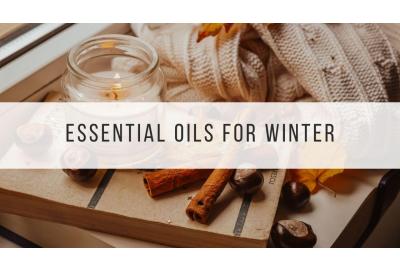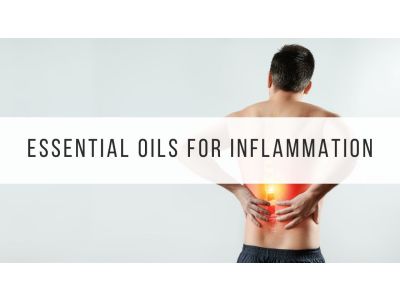Whether you’re in need of symptom-relief from winter coughs and colds, or you’re looking to ease muscular aches caused by the cold weather, or you simply want to create a cosy feel in your home, a good selection of essential oils is great to have in your arsenal at winter.
Here, we’ll be taking a look at the best essential oils to have on hand at winter, and what you can use them for.
Essential Oils for Coughs & Colds
Viruses are often rife at winter, which can put a dampener on the holiday cheer. Fortunately, there are a wide range of essential oils that can help alleviate the symptoms of coughs and colds. One of the best ways to use these oils is to inhale them via an oil diffuser, or by putting a few drops onto a tissue or handkerchief. Alternatively, you can incorporate some essential oils into steam inhalation. Just fill a bowl with hot water, add a few drops of essential oil, and then carefully lean over the bowl with a towel over your head and breathe deeply. The hot steam will work together with the oils to help decongest and soothe your sinuses and airways.
The following oils are known to be particularly beneficial for soothing the symptoms of coughs and colds:
Eucalyptus: Eucalyptus oil is particularly well known for its ability to ease congestion and sinus pressure related to colds and flu, and for helping to loosen phlegm and mucus associated with chesty coughs. In addition, it can help to relieve mental exhaustion, as well as improving focus and concentration.
Peppermint: Peppermint oil is a common decongestant. Menthol, which is a constituent of Peppermint oil, is commonly used is cough sweets to help soothe coughs and sore throats. If you’re very congested and in need of something a little stronger, try inhaling the scent of Menthol Crystals, which are obtained by freezing and then filtering Peppermint oil. They can quickly and powerfully alleviate sinus congestion, allowing you to breathe more clearly. However, it’s worth noting that Menthol Crystals are highly concentrated and can cause skin irritation if not properly diluted. It’s best to wear gloves when handling them.
Frankincense: While it is perhaps more commonly used for spiritual or fragrant purposes, Frankincense oil has also traditionally been used to help relieve congestion and catarrh associated with coughs, bronchitis and sinusitis, due to its expectorant properties.
Thyme: Another oil that’s often found in cough sweets, Thyme has traditionally been used to treat a range of respiratory disorders. Thyme oil contains antibacterial, antiviral and antifungal properties. It can be used to provide relief from chest congestion by helping to clear mucus and phlegm deposits, and can also be effective at soothing dry and irritated throats.
Pine: As well as being widely associated with the fresh and woodsy smell of Christmas trees, Pine oil is associated with having antiviral, anti-inflammatory and antibacterial properties. Species-wise, it’s similar to Eucalyptus, and so has similar abilities in helping to decongest the chest and sinuses.
Lavender: Lavender essential oil is well known for its ability to aid in relaxation, ease stress and anxiety, and promote restful sleep. Good quality sleep and low stress levels can greatly help with the recovery (and prevention) of colds and flu, which makes Lavender an excellent oil to have on hand when winter viruses are rife.
If you prefer to make use of essential oils by topical application, our all-natural Throat and Chest Balm contains essential oils of Peppermint, Eucalyptus and Menthol, as well as Wintergreen and Marjoram. It is safe to apply to the skin and can help soothe the symptoms of congested sinuses and chesty coughs.
Essential Oils for Muscle Aches
As the weather becomes colder, feelings of muscle aches, stiffness and joint pain can increase. Proper care and advice from a health professional should always come first, but you may also find the use of certain anti-inflammatory, muscle-soothing essential oils can help for mild muscular ailments.
Peppermint: Peppermint oil has anti-inflammatory and antispasmodic properties. The Menthol found in Peppermint oil is well known for helping to ease muscular aches, pains and cramps, as well as tension headaches.
Chamomile: Not just used to help decrease anxiety and improve sleep, Chamomile oil also has anti-inflammatory properties and is believed to help improve circulation. As such, it is used to help ease muscle aches, sprains, spasms and headaches.
Eucalyptus: As well as its ability to help with the symptoms of coughs and colds, Eucalyptus oil can help to ease muscular pain. It contains anti-inflammatory compounds which, as the name suggests, can help combat inflammation and swelling. It also has a cooling effect on the muscles, which can help soothe the feeling of muscle aches.
Rosemary: Similar in use to Eucalyptus oil, Rosemary oil has anti-inflammatory and analgesic properties, which is often used to help relieve muscular aches and pains, as well as rheumatic discomfort.
Helichrysum: Helichrysum oil is believed to reduce inflammation, decrease pain and help to repair blood vessels and nerves. It is both anti-inflammatory and antispasmodic, and can be used to help treat muscular aches and pains.
Black Pepper: Black Pepper oil is believed to help increase circulation, and contains anti-inflammatory and antispasmodic properties. It has a beautifully warming effect on the skin, helping to soothe tired and aching muscles and cramps.
Our popular Warming and Easing Balm can be massaged directly onto the skin to help ease muscular aches and pain. It contains a warming and stimulating blend of Camphor, Cajuput, Black Pepper, Ginger and Capsicum essential oils.
Alternatively, our Cooling and Soothing Balm can be applied to the skin to soothe tired and strained muscles. It contains a well-balanced blend of Yarrow, Chamomile, Menthol oils.
Essential Oils for a Cosy, Christmassy Feel
If you simply want to enjoy the smell of warm, Christmassy scents throughout your home during the festive season, you can create a beautifully cosy environment by burning your favourite oils in an oil burner, or adding to an oil diffuser. We particularly enjoy the following oils during winter:
For a sweet and lightly spiced aroma, choose essential oils of Cinnamon, Nutmeg, Clove, Ginger, Cardamom or Anise; all of which are instantly reminiscent of the warm aroma of Christmas baking. These slightly spicy essential oils can have the added benefit of gently energising the mind and stimulating a sense of alertness.
For rich and warming scents without the culinary association, try essential oils of Sandalwood, Peru Balsam or Frankincense. In the Western world, Frankincense is commonly associated with Christmas, so it can be an easy choice for evoking a Christmassy feel in the home. Frankincense also has the added benefit of reducing anxiety, increasing mood and improving concentration.
For a slightly fresher scent, essential oils of Orange, Juniper Berry or Myrtle are an excellent choice at winter. They are all uplifting fragrances, which can help ease feelings of stress and anxiety. In particular, Juniper Berry oil can ease stress without the sedative effects associated with some other calming essential oils. As such, it can help to soothe worries and anxieties, while retaining energy to tackle the busy holiday obligations.
To enjoy an instant uplifting, Christmassy smell as part of a topical application, try massaging some of our popular Orange Spice Massage Wax onto the skin, which contains a delicious blend of Orange, Mandarin, Grapefruit, Cardamom, Clove Bud and Nutmeg oils.
Alternatively, for a scent that’s woodier and ‘green’, try our Mountain Forest Massage Wax, which contains a beautiful blend of Australian Sandalwood, Cypress, Cedar oils.






